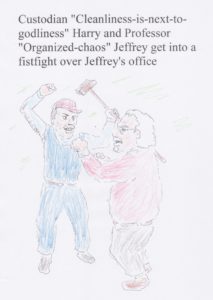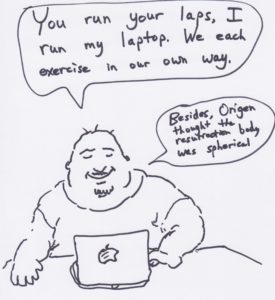Separated by civil war
For those who would like to read it, Crosswalk published our brief, true “Story of a Love Separated by Civil War.” It gives an inside-experience perspective on one kind of refugee crisis.
http://www.crosswalk.com/newsletters-only/evangelism/the-story-of-a-love-separated-by-civil-war.html
Interpreting Pharaoh’s dreams
Genesis 41
There were reasons why God had given Joseph practice in interpreting dreams. After some troubling dreams, Pharaoh sent and called Egypt’s wise men (41:8), but they could not interpret these dreams. As soon as he learned of the young Hebrew slave who interpreted precisely, however, he sent and called for him (41:14). People in antiquity highly valued precise knowledge of divine plans, but diviners rarely offered with many verifiable details. In Joseph’s case, as opposed to that of the other wise men, Pharaoh’s servants “hurried” him. The Hebrew term can mean something like “cause to run”; in any case, this would not be the first time in Genesis that running accompanies a sudden and divine turn of events (24:20, 28-29; 29:12-13).
Egyptians considered the Nile the source of life, and the dominance of lean cows and ears of grain are clearly negative signs. The details and solution, however, remained obscure. Why would a dream tantalize with only the barest elements of its meaning? Joseph’s father had important dreams (28:12; 31:10), but God spoke expressly in those dreams (28:13-15; 31:11-13), requiring little interpretation. Joseph, however, had had symbolic dreams, albeit with fairly transparent meanings (37:7, 9), and had been gifted to interpret even dreams with more complex symbolism (40:9-19), as the present one was.
Interpreting dreams for important officials of Pharaoh may have provided some practice for Joseph having to interpret dreams for Pharaoh, but the order of magnitude is now greater. This time Joseph is not offering interpretations (40:8) with nothing to lose; Pharaoh is requesting interpretations publicly, in front of his court (41:15).
This time, for Joseph and for the future of Egypt and the Levant, the stakes were very high. The cupbearer’s dream involved his action, and the baker’s dream involved himself, but Pharaoh is merely a spectator in his dream, which involves a scale of action beyond Pharaoh, one that would affect all of Egypt but was beyond Pharaoh’s control.
Joseph recognizes that dream interpretations come from God (40:8; 41:16). When God performs through us what only God can do, it is right to give credit where credit is due. Based on outcomes of various dreams, ancients compiled dream handbooks that provided interpretations for the various elements in dreams. Such handbooks could not offer the sort of precision and confidence of Joseph’s interpretations in 40:12-13 and 40:18-19, however. Individuals dream differently, and various dreams have different causes (cf. Eccl 2:23; 5:3, 7). But divinely-sent dreams were meant to reveal something (Gen 41:25)—yet needed divinely-given wisdom for interpretation. Even when we have past experience in doing something, we remain dependent on God for success. This was the God that Joseph trusted when he kept interpreting dreams (40:8), and the God he honored by refusing to lie with Potiphar’s wife (39:9).
Yet whereas Pharaoh’s advisors could not reveal or explain (magid) the dream (41:24), that was precisely what God wished to do (note hagid in 41:25). Sometimes we wonder why God allows bad things to happen on a large scale; but often warnings go unheeded or misunderstood because God’s agents are unheeded or unavailable. God is sovereign and yet wants to prepare people for the inevitable disasters in the world.
While some warnings invite us to pray that something may be averted (i.e., they are conditional prophecies), Joseph explains that God has established this matter and it is about to take place (41:32). Yet knowledge of this impending situation offers a solution as well. The dream does not specify the solution, but Joseph speaks here with God-given wisdom, as Pharaoh recognizes (41:38-39; note especially that the wisdom comes from God’s Spirit, as in Exod 28:3; 31:3; 35:31). Pharaoh’s “wise men” (41:8) could not resolve the dreams, but everyone is impressed with Joseph’s wisdom (41:39; cf. 41:33). God cares about people’s needs, and wisdom for public administration, famine relief, social ministry and the like comes from God (even among those who do not recognize this).
As the proverb says, one skilled in his work will stand before kings (Prov 22:29). Joseph had continued to trust God in his area of gifting. Now, at last, God was beginning to exalt him.
Some resources regarding miracles: 1-minute and 16-seconds
1-minute and 16-second interview at Oxford
1-minute and 16-second interview at Oxford:
Global reports of miracles (1 min, 13 sec)
Miracle reports from around the world:
Why did Craig write about miracles? (2 minutes)
Interview at Oxford University:
Ever met an incompetent know-it-all?
Matthew 8-9 (free lecture 10)
Matthew 8-9:
Explaining dreams in jail—Genesis 40
During periods of suffering, some of us forget God’s calling or our earlier vision for setting matters right (or even forget God’s earlier blessings, 41:30-31). Moses acted in support of justice for his people (Exod 2:12-13), but the failure of his attempt (2:14-15) and years in the wilderness made him afraid to lead again (Exod 3:11, 13; 4:1, 10, 13). Joseph, by contrast, seems to have held on to his recognition that God was with him. In prison, he was still ready to interpret dreams (Gen 40:12-13, 18-19), presumably meaning that he still believed in some way the dreams that God had given him years before (37:7, 9).
The prophetic dreams in the Joseph narrative come in pairs; this provides confirmation that they are more than coincidence (cf. 41:11, 32). Joseph has paired dreams about his brothers acknowledging his rule (37:7, 9); Pharaoh has paired dreams about the coming prosperity and following famine (41:2-8). Here the paired dreams, however, belong to different officials of Pharaoh, and also have contrasting rather than identical outcomes. In three days, Pharaoh would lift up the heads of both the cupbearer and baker (40:20). He would lift the head of the cupbearer figuratively, restoring him to office (40:13), and would lift the baker’s head literally—from off his neck (40:19).
Joseph’s message to the baker is horrifying. Whereas the cupbearer would again squeeze fruit into Pharaoh’s cup (40:11), the provider of Pharaoh’s food would himself become food for birds (40:17, 19). Whereas the cupbearer would take fruit from a vine (which at least many people in antiquity classified as a form of tree), the baker would be hanged on a tree.
Joseph interprets accurately the dreams of Pharaoh’s chief cupbearer and baker—and also has the courage to speak the hard truth to the baker as well as the favorable truth to the cupbearer (40:18-19). This succession of favorable and unfavorable interpretations prefigures his interpretation of Pharaoh’s dreams with both their favorable and unfavorable elements. Because the cupbearer saw both he can testify that Joseph will be able to tell the truth about Pharaoh’s dreams as well.
Joseph knows that Pharaoh could overrule a master’s decision concerning his slave and could free Joseph, so he asks the cupbearer to remember him with Pharaoh. Although it would be awkward for the cupbearer to raise an issue with Pharaoh, even one that didn’t remind Pharaoh of the cupbearer’s imprisonment (41:9), it was reasonable for Joseph to suppose that God had given him this connection for a reason.
Some apparent connections are simply tests, however, so we can never be sure in advance which ones will bear fruit. For example, as the king’s son-in-law, David might have seemed close to the fulfillment of Samuel’s prophecy about David’s future—until that very relationship exposed him more directly to King Saul’s rage. Joseph may have expressed his innocence to others, though the cupbearer is probably the highest official to whom he can express it. He can only hope that this connection might bear fruit.
But the cupbearer forgot—for two years. Sometimes God will use something, but much later than we expect. Like the farmer who sows widely hoping for harvest (Eccl 11:6), we consider possible opportunities and offer our best but depend on God to make the right ones prosper. In this case, Joseph would end up not only free, but as vizier over Egypt—fulfilling his own earlier dream of rule, and even far more dramatically than he expected. It is only after Joseph’s exaltation that he too will forget something—his father’s household (41:51, though using a different term). Moses forgot his earlier passion during hardship; Joseph forgot God’s earlier revelation in prosperity. But even after we forget, God has his way of bringing us back face to face with his calling, his promise.



